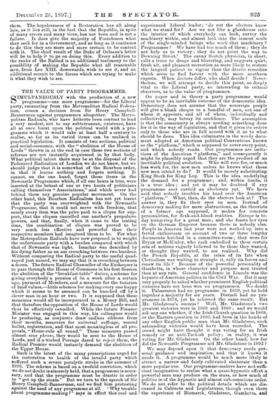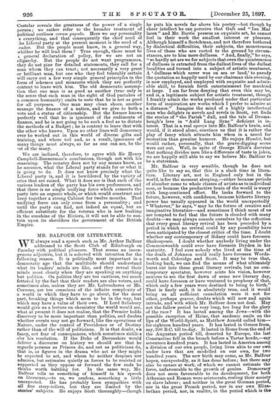THE VALUE OF PARTY PROGRAMMES.
SIMULTANEOUSLY with the production of a new programme—one more programme—for the Liberal party, emanating from the Metropolitan Radical Federa- tion, comes a decision from Sir Henry Campbell- Bannerman against programmes altogether. The Metro- politan Radicals, who have hitherto been content to lead a very modest, not to say subterranean, existence, have realise, so far as its varied items can be realised in practical legislation. It consists of two sections, political and social-economic, with the " abolition of the House of Lords" thrown in at the end in case thew two sections of reforms are not instantly acquiesced in by that body. What political talent there may be at the disposal of the Federated Radicalism of London we do not know, but we should judge that it is somewhat of the Bourbon order, in that it learns nothing and forgets nothing. It cannot, on the one hand, forget those items in the Newcastle Programme which, if all one hears is true, were inserted at the behest of one or two knots of politicians calling themselves " Associations," and which never bad behind them any genuine popular movement. On the other hand, this Bourbon Radicalism has not yet learnt that the party was overweighted with the Newcastle Programme, that it could not move with freedom, that nearly every item was the price paid to a clique for sup- port, that the cliques cancelled one another's propulsive powers, and that, finally, when it came to the testing time, the combination of cliques was proved to be very much less effective and powerful than their respective members had imagined them to be. For what the Metropolitan Radicals have now proposed is to weight the unfortunate party with a burden compared with which that of Newcastle was light. Issachar was described by his dying father as an ass crouching between two burdens. Without comparing the Radical party to the useful quad- ruped just named, we may say that it is crouching between a dozen. The future Radical Chancellor of the Exchequer is to pass through the House of Commons in his first Session the abolition of the "breakfast-table" duties, a scheme for giving everybody a pension of 5s. a week after a certain age, payment of Members, and a measure for the taxation of land values,—little schemes for making every one happy which it seems to be assumed can be knocked off by a clever man in an hour or two. It is supposed that these measures would all be incorporated in a Money Bill, and that therefore the opposition of the House of Lords would thus be effectively cancelled. While the future Finance Minister was engaged in this way, his colleagues would be producing, as conjurers draw endless ribbons from their mouths, measures for universal suffrage, second ballot, registration, and that most meaningless of all pro- posals, "Home-rule all round." These measures passed almost sans phrase, they would be sent to the House of Lords, and if a wicked Peerage dared to reject them, the Radical Premier would instantly demand the abolition of the Upper House.
Such is the latest of the many prescriptions urged for the restoration to health of the invalid party which suffered such a severe paralytic stroke in the summer of 1895. The scheme is based on a twofold conviction, which we do not doubt is sincerely held, that a programme is neces- sary, and that the programme must be drastic in order to " get up the steam." But we turn to the speech of Sir Henry Campbell-Bannerman, and we find him protesting against the need of any programme at all. Why trouble about programme-making?' says in effect this cool and experienced Liberal leader ; do not the electors know what we stand for ? Are we not like a glasshouse into the interior of which everybody can look, survey the machinery within, and almost look into the inmost souls of the single-minded beings who work that machinery ? Programmes ? We have had too much of them ; they do not help us to victory ; they do not point the way to Downing Street.' The canny Scotch physician, in short, calls a truce to drugs and blistering, and suggests quiet, fresh air, and pleasant recreation as more likely to restore the languid patient to vigour than the drastic remedies which seem to find favour with the more southern experts. When doctors differ, who shall decide ? Never- theless, we will attempt to decide this point, so deeply vital to the Liberal party, so interesting to critical' observers, as to the value of programmes.
On paper and in theory a party programme would'• appear to be an inevitable outcome of the democratic idea.. Democracy does not assume that the sovereign people will give a blank cheque to a handful of men, not one of whom it appoints, and all of whom, individually and collectively, may betray its confidence. The assumption is that the community is always needing something done for it in the way of legislation, and that it gives its orders only to those who are in full accord with it as to what should be done. This idea culminates in the wordy docu- ment adopted at American political Conventions known as the " platform," which is supposed to cover every point, and which nobody reads. Our programmes are imita- tions of the American " platform," and consequently it might be plausibly urged that they are the product of an inevitable political evolution. Who will vote for, or much less work for, the new men unless he knows what these new men intend to do ? It would be merely substituting King Stork for King Log. This is the idea underlying the demand for a programme ; and, within limits, it is a true idea ; and yet it may be doubted if any programme ever carried an electorate yet. We have said that nobody troubles his head over the American " platform." What, then, do the electors look at? The answer is, they fix their eyes on men. Instead of democracy making for mere abstractions, as the theorists of a former age supposed, it makes for concrete personalities, for flesh-and-blood realities. Europe is to- day hungering for a great man ; and she feasts her eyes on the German Emperor because there is nobody else. People in America last year were not worked up into a fervid enthusiasm on account of two or three lengthy documents hatched in a committee-room ; they were for Bryan or McKinley, who each embodied to them certain sets of notions vaguely believed to be those they wanted, or thought they wanted, to see realised. Why did the French Republic, at the crisis of its fate when Clericalism was waiting to strangle it, rally its forces and; renew its life ? Because of the powerful personality of Gambetta, in whose character and purpose men trusted. then at any rate. General confidence in Lincoln was the- keynote of American politics in the Civil War. But it may very properly be asked whether prominent English political victories have not been won on programmes. We doubt it. Palmerston had no programme in 1859, yet he held together a majority for six years. Disraeli had no pro- gramme in 1874, yet he achieved the same result. But Mr. Gladstone's success ? Well, Mr. Gladstone's two, greatest victories were in 1868 and 1880 ; and we would ask any one whether, if the Irish Church question in 1868,. or the Eastern question in 1880, had been in the hands of any other English public man than Mr. Gladstone, such astounding victories would have been recorded. The crowd might have thought it was voting for an Irish remedy or an anti-Turkish policy ; in reality, it was voting for Mr. Gladstone. On the other hand, how far did the Newcastle Programme aid Mr. Gladstone in 1892 ?
We may depend upon it that democracy needs per-. sonal guidance and inspiration, and that it knows it needs it. A programme would be much more likely to attract a narrow and fairly cultivated electorate than a more popular one. Our programme-makers have not suffi- 'cient imagination to realise what a quasi-hypnotic effect a powerful man may produce on the mass, or how much of politics is of the hypnotic and almost sub-conscious order. We do not refer to the political details which are dis- cussed in Cabinets and Legislatures, though even there the experience of Bismarck, Gladstone, Gambetta, and Castelar reveals the greatness of the power of a single person ; we rather refer to the broader treatment of political outlines coram populo. Here we say personality s everything, and that consequently the chief need of he Liberal party at the present moment is the need of a .eader. But the people must know, in a general way, whither he will lead them ? True enough, there must be general declaration of policy, for we are not an oligarchy. But the people do not want programmes, they do not pine for detailed statements, they call for a man whom they can trust ; not necessarily a very great or brilliant man, but one who they feel tolerably certain will carry out a few very simple general principles in the form of schemes and measures which they are perfectly content to leave with him. The old democratic assump- tion that one man is as good as another (true only in the sense that each man in the sight of God partakes of a common humanity) omits to note that he is not as good for all purposes. One man may clean shoes, another manage the finance of a nation, and we give to both a vote and a status of citizenship. But the former knows perfectly well that he is ignorant of the rudiments of finance, and he is not going to be such a fool as to dictate the methods of a Budget ; he is content to leave that with the other who knows. Upon no other lines will democracy ever be worked out in this world of diverse gifts and training, and where toil and, as a result, ignorance of many things must always, so far as one can see, be the • ot of the many.
We are inclined, therefore, to agree with Sir Henry Campbell-Bannerman's conclusions, though not with his reasoning. The country does not by any means know, as he assumes, what the Liberal party stands for or what it is going to do. It does not know precisely what the Liberal party is, and it is bewildered by the variety of cries that are raised. What it does see is that each of the various leaders of the party has his own preferences, and that there is no single unifying force which cements the party into an organic whole, or which would construct and keep together a strong Cabinet for twelve months. That unifying force can only come from a personality ; and until the party can find, not indeed an equal, but an efficient substitute for the veteran who is now basking in the sunshine of the Riviera, it will not be able to sus- tain upon its shoulders the government of the British Empire.



































 Previous page
Previous page